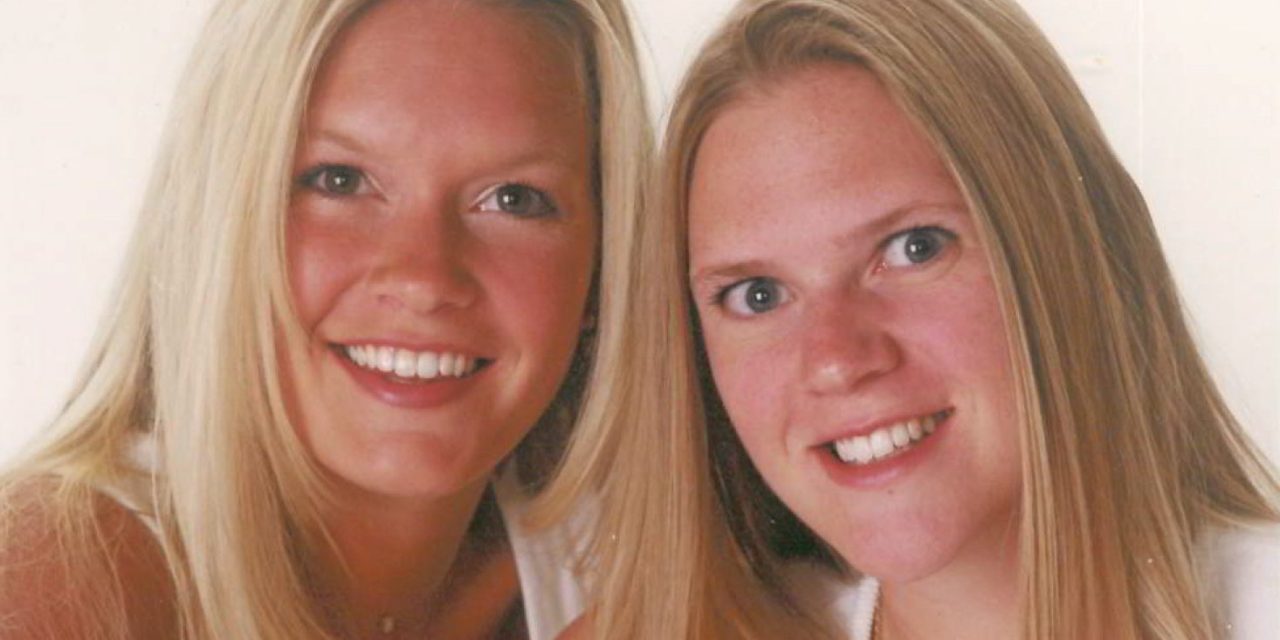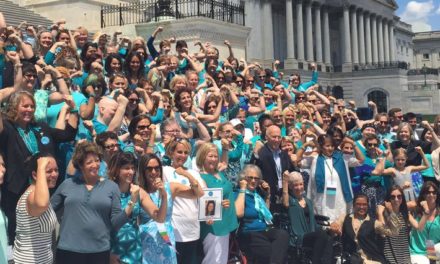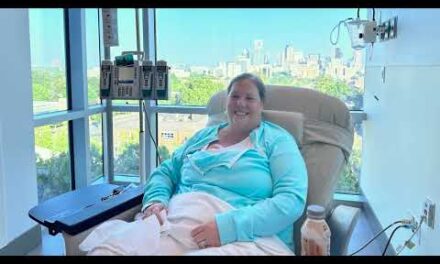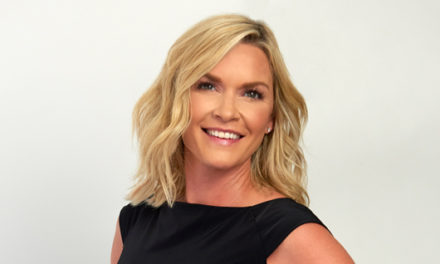A cancer diagnosis is like a grenade exploding at the center of a person’s life. Emotional shrapnel hits everyone within your circle, and while some people turn and run from the crisis, others run toward it, wishing against time that they could have jumped on the grenade themselves.
Jill didn’t have to sprint to be by her sister Sherry Pollex’s side: she’s been there her whole life. Born 23 months before Sherry, the two grew up as the best of friends, and that closeness continued into adulthood.
“I really thought we had a close relationship,” Jill shared. “Closer than most at this age. We live within miles of each other, neither of us has children and we have the same interests.”
 Jill and Sherry’s bond before the cancer diagnosis included weekly visits and near-daily phone calls. Some sisters exist via text alone. Not these two.
Jill and Sherry’s bond before the cancer diagnosis included weekly visits and near-daily phone calls. Some sisters exist via text alone. Not these two.
Even though Sherry is the younger sister, “she always played the role of the big sister,” Jill said. “Sherry was my caretaker, always making sure I had what I needed. She was the nucleus of our family, always organizing family events.”
Jill says Sherry’s fighting spirit began long before she needed it. “The Lord prepared Sherry to be a fighter! Our parents had a hand in it, too. We were brought up as strong, independent women with a voice. She was always the most outspoken and had the strongest personality in our family. She was different – and now we know why.”
But even a fighting spirit can feel fear, and hearing the words “stage three ovarian cancer” sent both sisters’ minds reeling. “We were both scared,” Jill said. “But looking back, her attitude just catapulted us into, ‘What’s next? We got this!’”
As with most patients who receive an ovarian cancer diagnosis, Sherry had little time to dwell on what the future might bring before launching into surgery and treatment.
“We had just enough time to prepare our minds for the fight ahead,” Jill said. “I still remember her wanting to shield me from the bad from day one. She was still [taking on the role of] the ‘big’ sister. She wanted me to believe it was all going to be okay.”
But life – and cancer – has a way of redefining roles and relationships. Sherry was wheeled into what was supposed to be a four-hour surgery, called “debulking” because surgeons work to scrape every last particle of cancer from a woman’s body. Instead, surgeons spent more than eight hours scouring Sherry’s body for every last trace of cancer.
Sherry emerged hurting from major surgery – and plunged into the confusing, unexpected reality of post-surgical menopause.
“Suddenly our roles changed,” Jill remarked. “I was the big sister again. I was the caretaker. I immediately found myself doing anything in my power to ease her pain physically, emotionally and spiritually. As chemo began, I started to feel like I had to protect her from whatever I could. I was feeling more like a mother than a sister. Not having children, this was a new feeling for me, one that took me by surprise.”
Eight hours were the difference between a woman longing to have children one day and a woman felled by a surgery that eliminated her hope of conceiving a child.
 “We didn’t talk much about her ability to conceive a child being taken from her in a blink of an eye,” Jill shared. “We just knew that was the Lord’s decision and we trusted in Him. Selfishly, it didn’t hurt me like it did her. I knew from this point on in our lives, I wanted every bit of her time and attention I could get. Our bond strengthened like no other.”
“We didn’t talk much about her ability to conceive a child being taken from her in a blink of an eye,” Jill shared. “We just knew that was the Lord’s decision and we trusted in Him. Selfishly, it didn’t hurt me like it did her. I knew from this point on in our lives, I wanted every bit of her time and attention I could get. Our bond strengthened like no other.”
Jill’s advice for other loved ones is a combination checklist and emotional boost. “Do your research!” she emphasized. “Get second and third opinions!”
Amid the overload of information, understand “you are going to get frustrated and confused,” she said. “You just have to do what’s right for your family and your diagnosis. Cancer treatments are not a ‘one size fits all.’ Each of us is different! Therefore, our bodies need different treatments to fight.”
Jill remembers overwhelming frustration that she couldn’t “fix it.” She struggled with accepting she had no control over the cancer ravaging Sherry’s body. “I think that is why I found myself constantly trying to make things better,” she said. “As I look back, there were times I felt like I was on auto-pilot. I had to do something!”
She encourages loved ones to give themselves some grace. “Your mental attitude is bigger than you can ever imagine,” she said. “Don’t let depression seep in.”
When Sherry finished her last treatment in January 2016, she couldn’t return to life as normal because that life had changed completely. The emotional and educational journey of fighting ovarian cancer created an entirely new person. While Sherry never lost her fighting spirit or her love of being active and enjoying life, every moment now had intense new value. She had dived into learning everything she could about spiritual and physical health and emerged stronger and healthier than ever – with a new mission to educate women and their loved ones on the symptoms of ovarian cancer.
Inspirational tweet:
The greatest gift a life-threatening disease can give u,is the gift of learning to live. To savor every moment &have no regrets.Go do that✌️
— Sherry Pollex (@SherryPollex) January 12, 2016
Ringing the bell:
Link: https://twitter.com/SherryPollex/status/686676086890053632
Ringing the today, finally DONE with chemo!!! After 17 months straight, I'm going to live my life!!!! Cheers pic.twitter.com/gGHfKU9Q7c
— Sherry Pollex (@SherryPollex) January 11, 2016
"It has been difficult for us both, navigating the waters of life after cancer,” Jill admitted. “We take it one day at a time. We strive to make new memories as often as possible. We have learned just how valuable life is and how quickly it can change. Our relationship is stronger than ever! She is taking back her role of caregiver all while managing a new life.
Jill’s strength mirrors her sister’s. “I have never wondered, ‘Why us?’” she said. “I know why the Lord chose my sister to walk this path. He made her tough, strong and hard-headed. We will continue to walk this path together and experience each peak and valley hand in hand.”
Jill doesn’t question Sherry’s role in the universe these days. She’s always felt incredible pride in her sister but remembers feeling a different surge of pride as she watched Sherry’s first television interview about her health.
“Here she was, my sister, telling the world about her journey. She was putting herself out there to help save lives. Finally, it was clear what God's plan was: Tell the world about this disease.
“And that is what we are doing.”






My sister who is 18 months younger than I am was diagnosed with Stage 1 breast cancer in February 2016. After surgery, they said radiation since no involvement in lymph nodes. The lump itself turned out to be Grade 3, which is more aggressive so now she also needs chemotherapy as a precaution. This Friday she goes for her second treatment. It’s all a little scary, but she will get through it. Our youngest sister and I are doing what we need to do to help her any way we can.